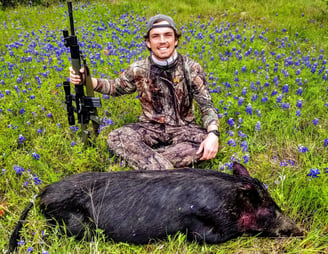Hogs are known all across America as a nuisance to farmers and a fun animal to hunt for outdoorsmen. These rugged animals’ population has flourished over the years, and it doesn’t seem to be slowing down.
Feral hogs have quickly become one of the most prevalent invasive species in the US. The most recent surveys show wild pigs across the southern US from Texas to Virginia with scattered populations now being found in Northern Michigan and Canada. With the US population of feral hogs estimated to be over six million the damage they create is extensive. Texas may be the one state that experiences the worst of the pig infestation with more than 2.5 million of the six million total being found here.

Where Did Feral Hogs Come From?
Common as they are in the American South, it might be hard to believe that feral hogs are an invasive species. Brought to the Americas by early settlers and explorers as a source of food, these swine flourished in the wild. Their population has spread significantly since then, causing problems for ranchers and farmers due to their destructive nature. They travel in large packs, searching for food by uprooting the topsoil and creating ravaged patches of land if left unchecked.
The American Hog
The wild hogs that populate the Americas today were once domesticated pigs that had gotten free and turned feral. After humans populated and established what is now America, Russian boars were brought over for the purpose of sport hunting. These wild boars then bred with the feral pigs, creating a combination of the two species that was then introduced to the population.
In short, the population of hogs found today is made up of feral pigs, Russian boars, and a hybrid species. There are 35 states or more that wild hogs can be found in, a majority of which are located in the South. From Texas to Florida, hogs can be found in troves. Reaching as far up as Missouri, their population is nearly as dense. They can also be found all throughout California.
Texas Feral Hogs
Unfortunately conservation efforts have not been able to outpace the pig population. While the number of pigs in Texas has grown so has the number of hunters that pursue them. This growth in popularity is a good thing. If enough hunters are able to slow or stop the hog population boom, they in turn save farmers money.
Texas Hog Hunting Regulations
Texas Parks and Wildlife continues to lower the barrier of entry to hog hunting and hopefully with enough pressure the pig population growth with slow down. With the pig problem in Texas getting worse every year, Texas Parks and Wildlife have removed almost all regulations from hog hunting.
To encourage hunters to shoot more pigs, TPWD has made the regulations simple and easy to follow. In Texas, hunters on private property do not need a hunting license to pursue pigs however, a license is still required to hunt public land. Feral hogs have also been calssified as an unprotected species which means there are no restrictions on bag limits, seasons, shooting light hours, or method of take.
How to Hog Hunt
In Texas, the best way to hunt hogs in my opinion is by using corn. Hogs love deer corn, and if they’re in the area, they’ll find it. There are many different ways to use this method though. They can be hunted at feeders or you can manually feed roads.
Hunting for hogs at feeders is pretty straight forward. You can use a blind just like you would for deer hunting. You could also place a feeder in a field where you know the hogs consistently are, then set it to go off late at night. After a while, the pigs will become accustomed to the feeder, and you can go out one night with a red or green light and hunt them. Hogs don’t see red or green light like we do, so you will be able to see them without spooking them.
Feeding roads is exactly what it sounds like. You drive around before dark and throw corn in the roads you wish to hunt later. Later at night, around 10:00 pm, you can hop back in the truck and drive the same roads you fed with a spotlight. This is one of the most fun ways to hunt for hogs in my opinion and, while somewhat unconventional, it’s a hell of a time.







